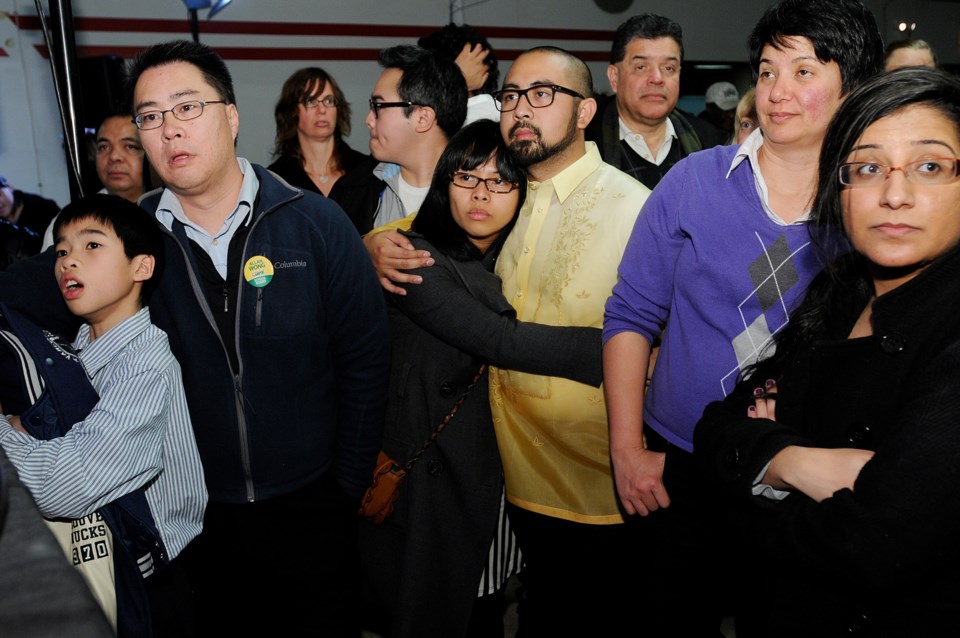It was a hot September afternoon when the Coalition of Progressive Electors (COPE) held its party meeting for members to choose candidates to run in this year’s municipal election. Seeking to energize the crowd packed inside the Japanese Language School’s stuffy auditorium while a round of ballots were counted, a young woman stepped up to the microphone and asked for the audience to follow her in some stretching exercises.
It was the last straw for one elderly man in attendance, who earlier in the day had also been asked to stand and do the Chicken Dance. He slowly made his way to the stage with the aid of a cane to speak his mind.
“I’m an anarchist,” he said angrily. “I’m not here to be told what to do. I’m here for serious business.”
The incident was minor but seemed to hint at major divisions within the long-standing left wing party that has seen high-profile members depart in recent years and finds itself on the verge of irrelevance if it can’t elect any candidates next week.
Getting candidates re-elected, of course, isn’t an option after school board trustee Allan Wong, the only COPE candidate to get voted in last time around, defected in 2013 to the ruling Vision Vancouver.
Wong, who was first elected in 1999, said he has no hard feelings towards his former party but the decision to change horses in midstream wasn’t difficult.
“Mine was a very easy choice, it wasn’t by lightning, in that I’d worked with the Vision trustees even prior to the six years that we were on the board together,” said the 49-year-old father of four. “Vision and COPE worked very closely and many of the issues that I am associated with — the seismic upgrading of schools, public funding from the provincial government, the LGBTQ Pride — we’ve worked closely on a lot of those policies and directions and it was a natural move. After the last election, I felt like COPE itself had moved and changed. I think there was a lot more focus on [city] council as opposed to school board.”
Wong, who is seeking his sixth term on the VSB, said he is simply more interested in helping students reach their potential than he is in partisan politics or the business of running the country’s third largest city.
“There was a lot of infighting and more politics rather than having real support for public education and support for our students. Rather than spend my time on other things, I’d like to focus directly on issues of schools because this is what I am interested in and putting my energy into rather than go off and talk about things like ‘How many [candidates] are we running?’ ‘What is the organization?’ ‘We need to run someone for mayor.’”
COPE has five people running this year for school board — Diana Day, Ralph Fraatz, Heidi Nagtegaal, Kombii Nanjalah and Illana Shecter — but all of them are seeking the office for the first time.
“A lot of what I’m hearing about their campaign is that it sounds good, but the people with the long experience that are familiar with the issues and really are curious about the issues, and have shown this in the past, are the Vision trustees,” said Wong.
He also isn’t the only former COPE trustee running under a different banner.
Jane Bouey, who served two terms on the board, launched a new party called the Public Education Project (PEP) with fellow former COPE candidate Gwen Giesbrecht. Bouey and Giesbrecht came in 12th and 11th place, respectively, in a race for nine possible positions in the 2011 election.
Giesbrecht told the Courier she decided to jump ship for similar reasons.
“It was a little disheartening for me, a strong education advocate, how little opportunity there was to really talk about education,” said Giesbrecht, a former chair of the Vancouver District Parent Advisory Council and current chair of the Britannia Secondary Parent Advisory Committee. “You spent a lot of time talking about… my opinion of this council candidate or that mayoralty candidate.”
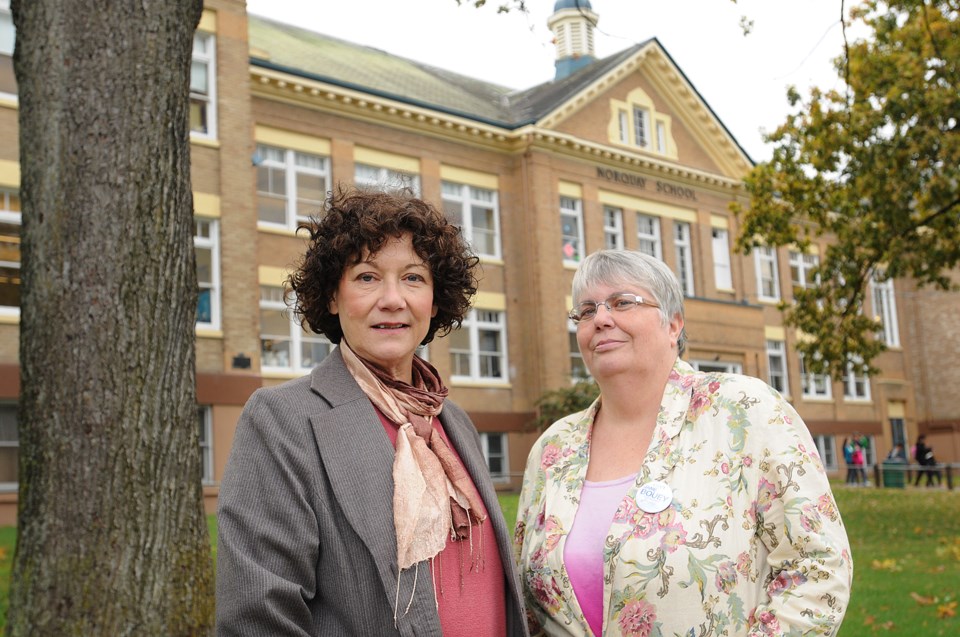
HIGH-PROFILE DEPARTURES
The three members’ abandonment of COPE, which has been the party of the working class in the city for nearly half a century, is far from the only recent example. Other prominent members who have left the leftist party include former park board commissioner Donalda Greenwell-Baker, former Vancouver-Kensington NDP MLA and B.C. Teachers’ Federation president David Chudnovsky, sex trade workers’ rights advocate Jamie Lee Hamilton and former park board candidate Brent Granby, who is running for Vision after former candidate Trish Kelly bowed out of the race. Two-term councillor Ellen Woodsworth, who lost her seat in 2011 by 91 votes to the Green Party’s Adriane Carr, was conspicuous in her absence at both the nomination meeting and the July annual general meeting.
Former executive member and B.C. Green Party leader Stuart Parker resigned in March, blaming internal party friction in a bitter letter to supporters explaining his decision.
“COPE’s toxic, meeting-intensive culture of interminable, acrimonious, incoherent nonsense that is politely called ‘debate’ would drive any sane person out of active participation within two years,” he wrote. “This is not an accident. This is the plan.”
Three-term city councillor David Cadman, the party’s mayoral candidate in 1999, also no longer has any involvement.
“I’m not actively a member but they still owe me a lot of money so I don’t know if they still keep me on the membership roll,” said Cadman, referring to money still outstanding from a $50,000 loan he provided in 2002 to help pay off party debts. “Basically, when I lost the nomination, I really haven’t had anything to do with them since so I don’t know what’s going on with them anymore.”
On Wednesday, Cadman distanced himself further from the party he once led by giving his endorsement for Vision Vancouver’s Gregor Robertson to stay on as mayor for a third term.
Rafael “RJ” Aquino is the person who ended up taking Cadman’s place on the ballot three years ago, and it came as a shock to many people when he beat out a proven vote-getter to fill one of three spots on a council slate that was the maximum allowed as part of an agreement with Vision. Out of 614 ballots cast by party members, Woodsworth earned the most nominations with 534, former city councillor Tim Louis got 345 while Aquino came in third with 316, only seven more than Cadman. The decision by members to push out an incumbent in favour of an inexperienced candidate was widely perceived as a coup orchestrated by Louis, who is also running again this year. It’s a move that arguably backfired considering none of them ended up getting elected.
Aquino is again running for city council this year but opted to start his own party, OneCity Vancouver. He said COPE infighting played a big part in his decision.
“For me, the biggest frustration was I introduced a lot of people, especially from the Filipino community, not necessarily just to the party but to civic politics and to this layer of government that most directly affects their lives, for them to then be turned off from the process due to disrespectful behaviour or condescending remarks and that sort of thing,” said Aquino, a 33-year-old new father who works in the tech industry.
“I was drawn to COPE at the time because of its values, and the people I am working with now at OneCity were also COPE members and I loved working with these people because not only did we share the same values but they were just as motivated to bring about the change we wanted to see in the city. All I can say is there is still an appetite for an incredibly progressive party in this city that can work with people in a respectful way where we can work together rather than be acrimonious. It’s important that you are not afraid to bring your friends to an annual general meeting and having them be exposed to shouting matches.”
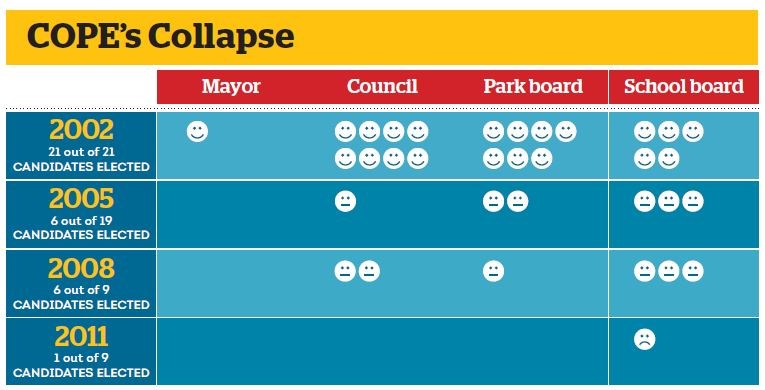
SWEPT FROM POWER
It seems somehow fitting that a party named “COPE” is facing a struggle to survive. The Canadian Oxford dictionary defines the word as “to struggle or deal, especially on fairly even terms or with some degree of success,” but the party’s fall from grace with the electorate has been a particularly dramatic one given that, only a dozen years ago, it was voted into power by a landslide.
Mayoral candidate and political newcomer Larry Campbell, a colourful former chief coroner and inspiration for the lead character of the hit CBC drama DaVinci’s Inquest, won 59 per cent of the popular vote in 2002, nearly double Non-Partisan Association runner-up Jennifer Clarke’s 30 per cent. After running on a platform calling for a more open and accountable civic government, including the promise of a public referendum on hosting the 2010 Winter Olympics, every single COPE candidate was elected with eight out of 10 city council seats, seven of nine school board trustee positions and five out of seven spots on park board.
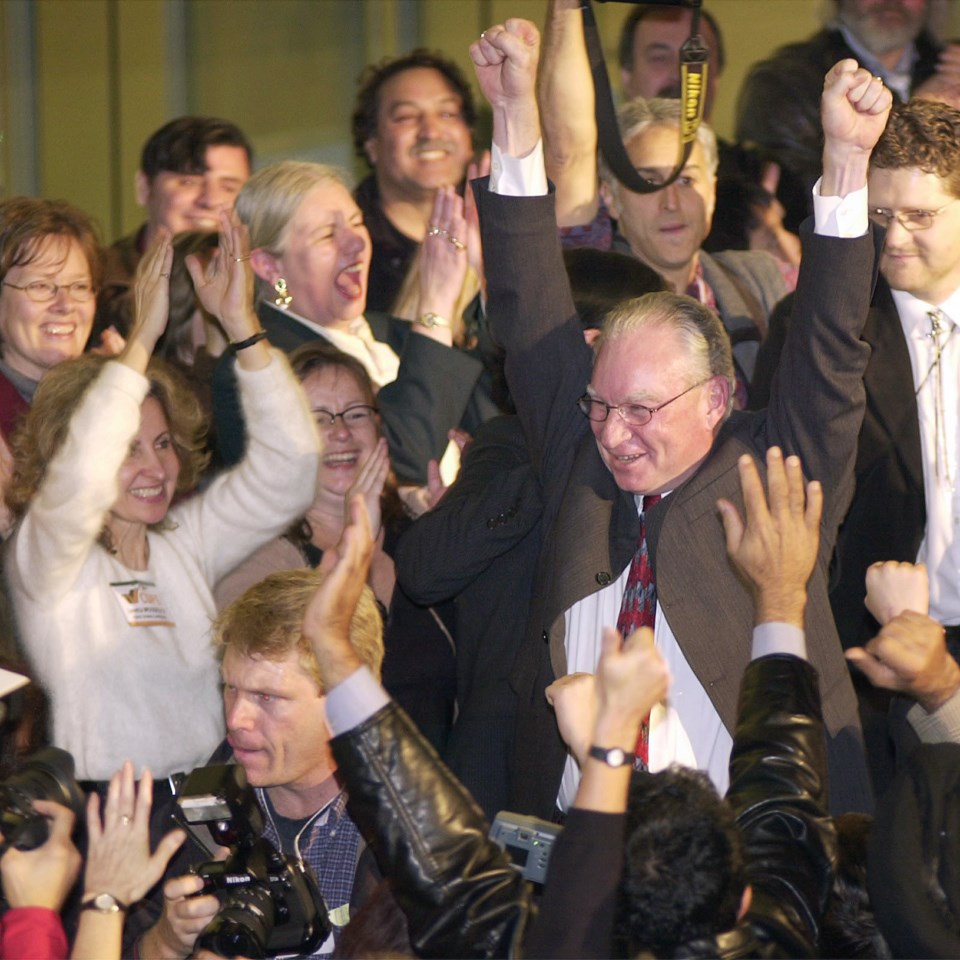
But the honeymoon period was short-lived. Campbell, seeking to distance himself from what he once described to the Courier as the party’s “wild-eyed revolutionaries,” formed an insiders’ sub-caucus with councillors Jim Green, Raymond Louie and Tim Stevenson that media and city hall watchers amusingly dubbed “Diet COPE” while the faction made up of Cadman, Woodsworth, Louis, Anne Roberts and Fred Bass became known as “COPE Classic.”
Campbell ultimately accepted a cushier and more lucrative job offer to become a senator rather than run for mayor a second time but the splinter group moved on without him and gave themselves their own new name — Vision Vancouver — in time for the 2005 election. COPE opted to not run a mayoral candidate against them in the past three elections to avoid splitting the progressive vote. This time it’s different.
MAYOR WONG?
Mayoral candidate Meena Wong, who joined COPE in 2005 after relocating from Ontario, thinks splitting up the party was a mistake and that voters are fed up with being ruled by parties such as Vision and the NPA widely perceived to be more beholden to the interests of real estate developers than citizens.
“Vision came out of COPE, right, and I see that as a betrayal, but of course not everybody believes that,” she told the Courier in a recent one-hour livestreamed interview. “We can see the result when they are in government and they [are] obviously pro-developer. We gave them three elections without running someone for mayor to see if they would change and obviously we are very disappointed so that is why we decided to have a [mayoral candidate] and that is why I decided to run for mayor. I have 90 per cent of membership support because of what I believe in, because I am for having people work together.”
Wong earned 193 out of the 216 ballots cast to be the party’s candidate, a drop of nearly 400 from the number of members who voted in 2011.
Wong, a 53-year-old mental health services worker and activist who hopes to become both the city’s first female mayor and first Chinese-Canadian at the helm, believes the party’s platform — which includes creating a Vancouver housing authority, introducing a living wage policy of $15 per hour and legislation to stop “renovictions,” and holding a referendum on switching from a first-past-the-post voting system to proportional representation — will resonate with voters. Her proposal to levy a surcharge on absentee owners who leave their properties vacant for more than 12 months at a time — a hot-button and racially charged topic in Vancouver due to many owners being from overseas — also drew a lot of attention. Wong remains in a very distant third place in polls but she says this doesn’t faze her, pointing to the widespread predictions last year that NDP leader Adrian Dix was a shoo-in to be the province’s next premier.
“Do you trust polls even after the B.C. fiasco?” she asked. “So that’s one thing. And second, the polls show us going up. I’m very confident that the people of Vancouver will make the decision. Don’t let the polls tell you. Make the decision up for yourself.”
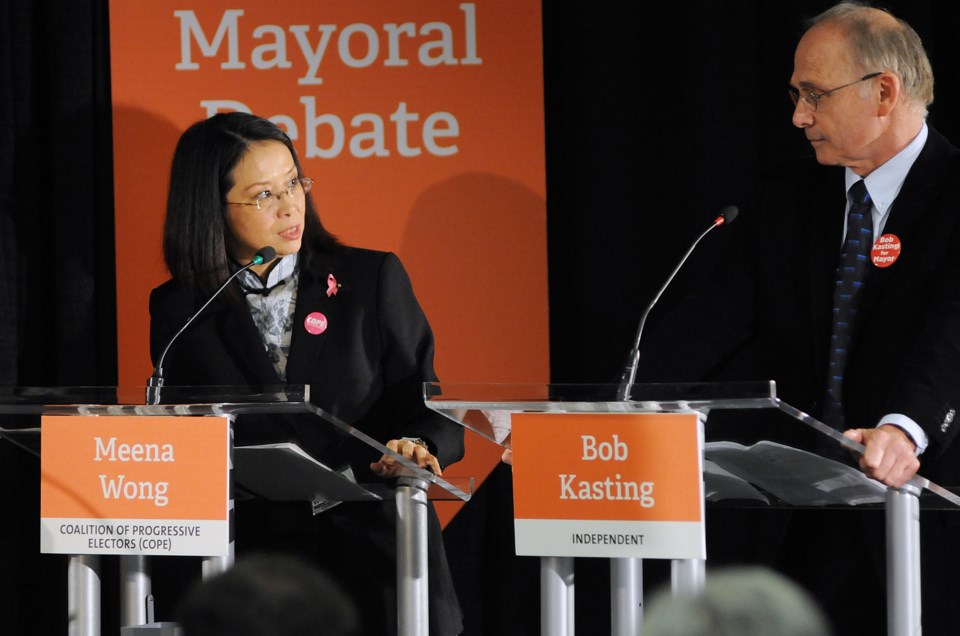
But while she may have widespread support within the party, the party no longer has the support of one its biggest traditional backers.
The Vancouver and District Labour Council (VDLC), which founded COPE back in 1968, instead endorsed Mayor Robertson and all eight Vision city council candidates. The only COPE candidates out of 16 running to receive labour’s blessing are prominent trial lawyer Gayle Gavin for city council and former commissioner Anita Romaniuk for park board.
Former COPEsters Aquino, Bouey and Giesbrecht all received endorsements from the influential labour council.
COPE’s cupboards are also considerably barer this year due to a reduction in union funding. CUPE Local 1004, for example, only offered $5,000 to COPE’s campaign — the same amount given to the newly launched PEP — while OneCity was handed $8,000 and Vision $102,000. The total donated amount COPE announced so far this year is $60,114 — $18,440 from unions, $41,474 from individuals and $200 from an unspecified corporation.
For comparison, the Green Party of Vancouver announced $46,387 in donations this year and OneCity slightly more with $47,286. Neither Vision Vancouver nor the NPA, who unlike COPE both accept unlimited donations from development firms, had announced the amount they’d received by the Courier’s print deadline, although Vision spent $2.2 million on its 2011 campaign and the NPA $2.5 million.
Gavin, whose legal expertise has been put to use recently by the Residents Association Mount Pleasant in its fight against the controversial Rize Alliance development, said being the VDLC’s only COPE council candidate out of eight to be recommended didn’t come as a true surprise even though she hasn’t run for office in more than 30 years.
“I have lived a long life and nothing much surprises me but I keep moving forward,” Gavin said over the phone Thursday morning. “I am running for COPE because I’ve been a longtime member and because I think politics is too important to be left to the politicians.”
Gavin said she was heartened by the Occupy movement of three years ago and believes growing wealth disparity and social justice issues are still very much on voters’ minds as problems that need to be tackled. She acknowledged that COPE has seen many members leave the party in recent years but that it continues to attract talented new members to fill the void.
“I see COPE not as something sacred but as a vehicle that the working people of this city have worked really hard to get up and running and to maintain. We can look at it maybe as a bus — there are different drivers at different times, different people get off and get on, but it is a vehicle for working people. Just by running for COPE, you’re going to get 10, maybe 20,000 votes, and we are working really hard because we want to get that 44, 45 [thousand] or whatever it is going to take this time for our council to be a COPE council as well as our school board and our park board. It will just be so good for the people. “
The election is Nov. 15.
afleming@vancourier.com
twitter.com/flematic
